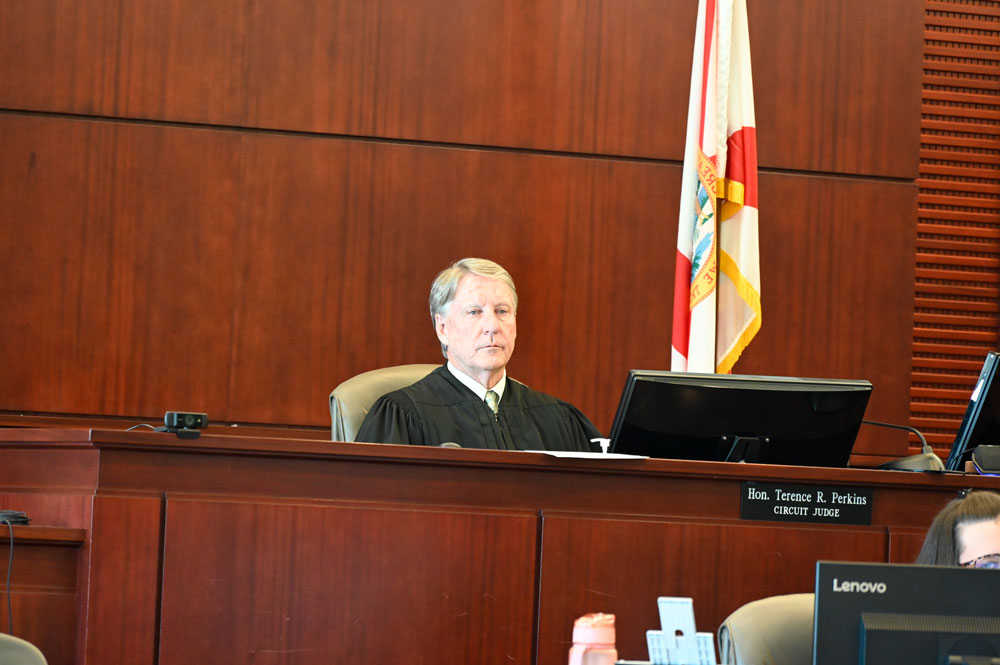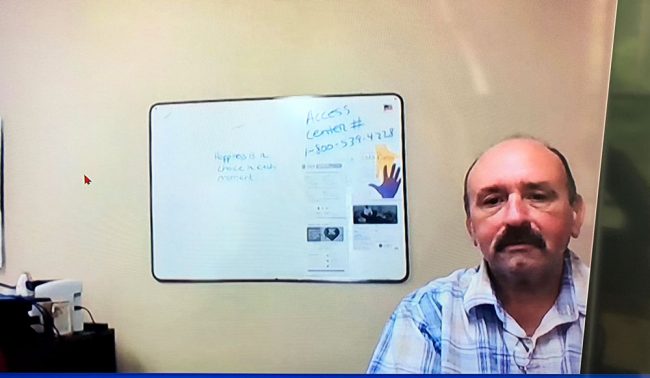
Ending months of hearings and uncertainty, Circuit Judge Terence Perkins this afternoon ordered Richard Dunn involuntarily recommitted to a state hospital, where Dunn had spent seven and a half years after stabbing his father to death at their home on Clarendon Court in Palm Coast in 2006. The decision came at the end of a hearing segmented between Monday afternoon and this afternoon.
It isn’t clear when Dunn will be transported to a state hospital. There is a waiting list of 565 people for a bed currently, according to SMA Healthcare Forensic Case Manager Melissa Eugley. Meanwhile, Dun will remain in jail.
Dunn, 62, has been at the Flagler County jail on a probation violation since September 23. He’d smoked pot in violation of his release conditions. In 2008, Circuit Judge Kim Hammond found Dunn not guilty by reason of insanity in a non-jury trial. Dunn faced a second-degree murder charge in the killing of Jack Dunn, 89, when Richard, who is schizophrenic, had stopped taking his prescribed medication. He spent seven and a half years locked up in a state hospital, then seven years at a halfway house before the court allowed him to live on his own, if still under court supervision and with conditions to meet with counselors and follow his prescription regimen. He’d been slowly making his way back to full freedom.
Eighteen months ago Dunn wrote Assistant State Prosecutor Melissa Clark a neatly handwritten two-page letter: “I’m writing to you & the court to terminate my conditional release,” he started. “Let me preface all remarks by saying I know the gravity of my crime in 2006, but through the faith-based program of Free Spirit & my weekly participation in Catholicism I have come to grips with what transpired.” In court hearings last year his normalcy was convincing enough , and his counselors and therapists supportive enough (including Eugley), that Perkins further loosened some reins. As late as last June, Dunn’s monthly medication dosage was reduced (he was complaining of side effects) and Perkins was considering a reduction in counselor visits.
Soon after that reduction in dosage, Dunn began acting as he had around the time of the killing–having hallucinations, hearing the sounds of Stevie Nicks and Fleetwood Mac (just as he had when he killed his father), “seeing Jesus everywhere,” showing up at a caretaker’s home at 2:30 a.m., and not seeing anything wrong in his behavior, according to counselors’ reports. Two assessments displayed in court were contradictory: one, from last Sept. 21, suggested he “does not appear to have any obviously delusional thought processes,” while an email from a counselor raised more alarms and noted that “when he decompensates, it gets very bad.”
His health care supervisors had no legal means of reinstituting his involuntary commitment, or even reducing his freedoms. The probation violation gave authorities room to maneuver. While he sat in jail on no bond, attorneys on both sides began arguing in hearing after hearing what his fate ought to be. He was re-evaluated by a psychologist, by court order. The psychologist determined he should be recommitted. His lawyer, John Hager, argued against it and had two expert witnesses of his own testify to that effect, though Assistant State Attorney Jason Lewis did his best openly to all but mock one of them because he’d been simply hired to speak his conclusions and had never met Dunn. The other witness had treated Dunn.
Hager himself has only been Dunn’s lawyer for a few weeks after replacing Assistant Public Defender Regina Nunnally in early November. “Just in me meeting Richard and knowing him for the period of time that I’ve known him, he’s deadly afraid about going back there,” Hager said of the state hospital. “It’s deplorable, deplorable conditions. He said he wasn’t getting the help. Obviously there’s issues with his mental health. But nothing here, in the record from yesterday and today, from either side, has said that he has manifested any danger to himself or others and he’s able to provide for his daily basic needs.”
Lewis brooked no sympathy for Dunn. “We have a concern,” the prosecutor said. “I know Dr. Davis evaluated him. He was a court appointed psychologist, not even by either side. And his evaluation determined that he felt like Mr. Dunn was a danger and that he needed to go to the hospital to get stabilized.” Lewis did not disagree that it may be merely a matter of adjusting medication. But he wanted that done under strict supervision.
Perkins reduced the issue to a few questions. “Let’s assume that the dosage gets changed, right?” he asked both sides. “Number one, who’s going to change that dosage? Who’s supposed to do that here? And number two, how long is it going to take for that dosage to take effect? And what do we do with with Mr. Dunn during that time, because he’s in the jail. He’s not receiving treatment. They’re giving him some treatment, but that’s not the purpose. He’s in jail. So where’s the best place for him to be to receive that treatment and to absorb any risks that may be associated with whether or not that treatment is effective? Isn’t that really the question here?”
Hager thought that could be done without institutionalizing Dunn. “It’s not a month. They don’t stay there for a month,” Hager said of any state hospital stint. “Never in 24 years I’ve ever seen a client go to the state hospital and be released in a month.” He added: “since 2012 when he was released, he had been fine. He’s been fine up until the time they changed his medication.”
Dunn, who’d sat or stood in front of the remote-link camera from the county jail Monday and today, interrupted. He wanted to speak. Hager advised him not to. “I don’t think you’re going to say anything that would change what’s been done, or going to be done,” his lawyer told him.
Dunn ignored him.
“The drug’s already been changed, I’ve been on my new dose for four months now and have been stabilized,” Dunn said, though on Monday Davis, the psychologist, had reported that Dunn was taking his medication only half the time. “I don’t think that’s been brought up.”
“So, Mr. Dunn, your attorney just said ‘I wouldn’t say anything,’ and now you just rattled off about four sentences,” Perkins said. “So are you going to follow the advice of your attorney, or are you going to say what you want to say? But if you want to say what you want to say, the state’s going to have an opportunity to cross-examine you.”
“I apologize, Judge,” Dunn said.
“Do you want to say anything else, or do you want to remain silent?” Hager asked him.
“I remain silent,” Dunn said.”
Perkins then ruled.
“This is a close call,” the judge said. “And there certainly are indications of evidence both ways. Here’s where I come down on. I think that Mr. Dunn is decompensating.” He cited evidence of illegal drug use, failure to follow treatment recommendations and treatment advice when he had an unexplained burn, some indication of “hostility if not combativeness, is what I heard, and that combined with some inappropriate, bizarre behavior that was described,” uncharacteristically so when compared with Dunn’s behavior when his medication was properly dosed. The best place for him to be rebalanced and stabilized, Perkins said, is a state hospital.
Perkins acknowledged Dunn’s progress over the years. “He was doing so well, for so long,” he said. “So I want to see him stabilized at the hospital and I want to see him as quickly as we can return back to his conditional release where he was doing so well. I’m going to grant the request and and have him involuntarily committed, remanded for that purpose.”
![]()






























The dude says
It’s kind appalling to me that this outcome was ever even in question.
Ray W. says
It seems apparent from the article that Richard Dunn opposed being court-ordered into placement in the state mental hospital. The State sought court-ordered placement in the state mental hospital. The individual possesses rights. The State possesses powers. Should we just automatically adopt whatever the State seeks?
In a justice system based on the ideas that a judge sits as a neutral and detached magistrate, and that procedural due process requires notice and a right to be heard, comments like the one posted by The dude are reflective of a desire inherent in human nature to discard the rule of law and just do whatever feels good or at least less bad than the alternative. Our founding fathers understood this facet of human nature and insisted on including language in the Constitution that requires a neutral and detached magistrate who sits between the State and the citizen and procedural due process.
It seems to me that the correct legal rulings occurred at each step of the case. It can be argued that, once again, Judge Perkins, like so many of his predecessor Flagler County judges, followed the law. Those who repeatedly comment on FlaglerLive that judges are commonly soft on crime simply do not yet know enough about our criminal justice system to know that for the most part it is working as it should. Presumptions of innocence are upheld. Justice commonly prevails over vengeance. The feeling of being appalled has no place in a system based on the rule of law, dominated by the ideals of reason and choice, instead of compulsions based on accident or force.
The dude says
The guy never should’ve been let out after stabbing his father until he was dead. Pure and simple.
Sorry he has mental issues but after stabbing his father until he was dead, the fact that he was and always will be a menace to society should’ve been acknowledged and action taken to mitigate that risk to society.
Your lofty ideals for an impartial justice system, while noble, are simply not practical and our justice system will never get there. Not in this day and age anyway.
Any time, and I do ANY time you step in front of a judge, your “rights” are exactly proportional to the size of your checkbook. “Justice” ain’t free.
Dennis says
Pretty sad. With a 365 person waiting list, this guy will be in jail a long time without the services he needs.
Charlie says
Good move your Honor.
palmcoaster says
Judge Perkins is right! The community needs to be safe from this ill man before asnother horrible tragedy takes place!
Geezer says
“Fleetwood Mac” is when you eat a burger in a Cadillac, listening to Spotify.
Mom of schizophrenia says
People with this kind of mental health are known to stop taking their meds when they feel good. I know, my daughter is one of them. He needs to be constantly monitored. No one wants to see these individuals locked up for life, though he brought it on himself. They will lie to their doctors to get off medication because they truly believe there is nothing wrong with them. The judge made the right call.